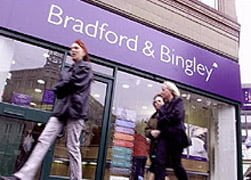Bradford and Bingley are the latest bank to catch a cold in
the present financial crisis. They’ve declared a loss of £8m for the first four
months of 2008. This compares with £108m profits they made in the same period
last year.
The main reason for the losses is because they’ve had to
write down £89m of their assets. ‘Write down’ is banker-speak for the fact that
they realise they can whistle for their money.
B & B is the market leader in ‘buy to let’ mortgages.
One of the features of the housing bubble which has now burst is that people
were buying houses, not only to live in, but also to lease to other people.
This of course tended to push house prices even higher. ‘Buy to let’ was based
on the assumption that house prices would just keep on rising. In that case not
only had the buyer acquired an ever-appreciating asset, but they could also
make enough money by letting it out to pay the mortgage. Free money!
When the housing bubble burst, the whole logic of ‘buy to
let’ went into reverse. Not only is the house price going to fall after the
deal has been struck, so the buyer is in effect stuck in negative equity, but tenants
are expecting to pay less rent, since they know house prices are headed south.
The ‘buy to let’ market, worth £120bn last year is now effectively dead in the
water. And of course all those people jumping ship from the housing market will
make the house price collapse that much worse.
So the number of those in arrears with B & B has risen
sharply this year. It’ll get worse. The bank has had to sell 23% of its shares
to the private equity firm Texas Pacific for £179m. Texas Pacific are not
philanthropists. They buy into firms for what they can screw out of them.
Bradford management are playing a dangerous game.
B & B have also been forced to ask for a rights issue of
£258m. This means that shareholders are expected to reach in their pockets and stump
up for extra shares. Now ‘investors’ don’t really buy shares so they can have
further demands put upon their wallets. They expect to sit at home and watch
the dividends roll in and the shares going up. So a rights issue will always
hit existing share prices.
And so it has proved. Bradford shares have dropped by two
thirds in the past six months and fell 40% in the last month. The announcement
of the loss meant B & B shares took a further tumble. The panic spread to
other bank’s shares. After all, they’re all in the same pickle.
Bradford and Bingley have just demonstrated they had an
urgent need for more than £430m. These are panic measures. You can be sure they’re
in big trouble.
We can all have a good laugh at the problems of financial
institutions. But the trouble is, the financial crisis is impacting on the real
economy. House prices are now definitely falling in the UK – maybe by 10% a
year, maybe more. Does that mean it’ll be easier to buy a house? No, it will be
harder. Interest rates are higher, which means a mortgage will cost more. The
Bank of England would probably like to cut rates, but inflation is on the rise,
so that’s ruled out. The banks are adjusting over a million mortgage interest
rates this year, and it’s going to hurt. They are determined to spread their
own misery around to the rest of us.
The level of mortgage approvals has actually halved over the
past few months, since the house price bubble burst. No longer will the likes
of Northern Rock chuck 125% mortgages at borrowers, so you can build a patio
and have a holiday in Thailand while you’re buying a house. No, they want only
fine, upstanding and, above all, solvent citizens on their books.
A house price collapse doesn’t just affect the unfortunates
who buy at, say, £200,000 and find their precious house is only worth £150,000
a year later. They’re stuck in negative equity. They can’t afford to pay for
the house and can’t move out. Negative equity blights whole neighbourhoods, as
it did in 1992 in the last house price collapse.
And of course it brings new housebuilding to a stop. There
are early signs that that is already starting to happen in Britain.
The
Financial Times published an article (June 1st) headed ‘UK nears
recession’. They quote Michael Saunders of Citigroup as saying. “Lots more
economic pain lies ahead. The UK economy is heading close to recession and the recession
risks are rising.” The recession is an inevitable outcome of unplanned
capitalism, interested only in profit. It’s not our fault. Let’s make sure they
don’t dump the pain of their recession on the working class.






